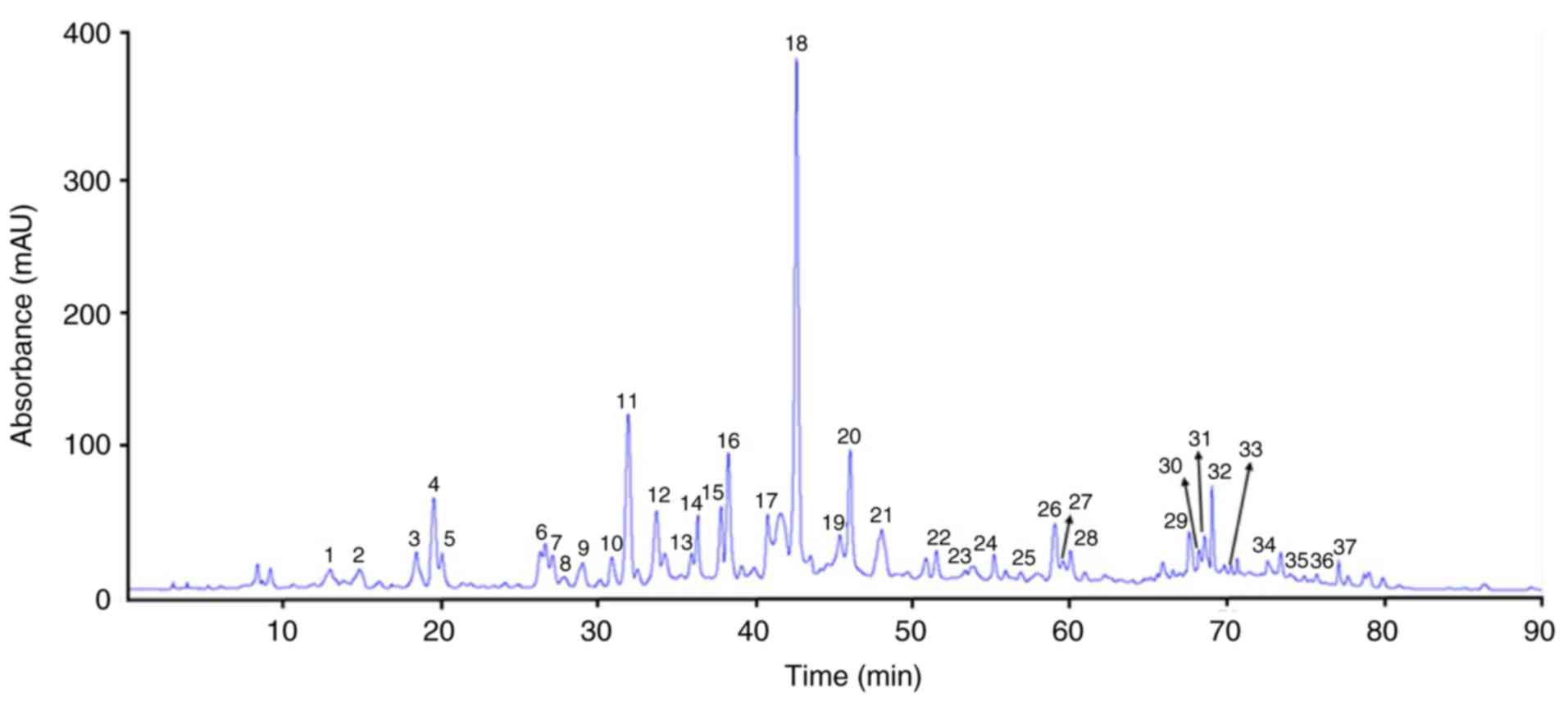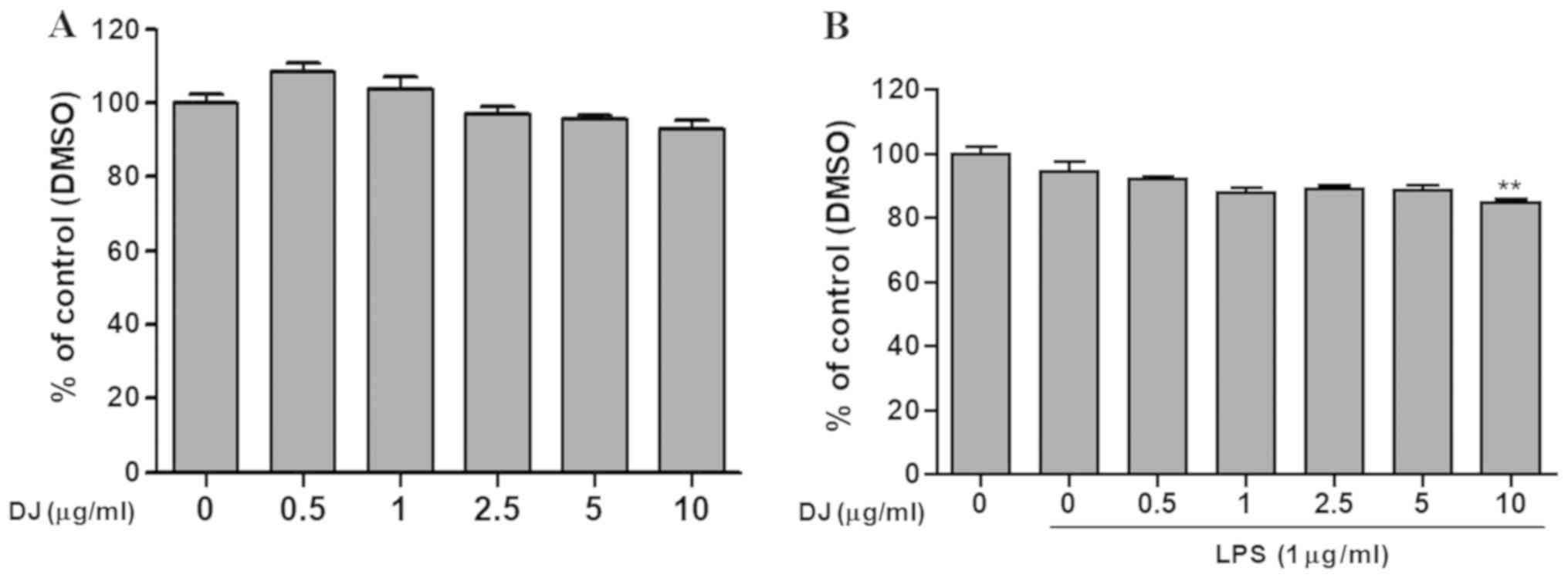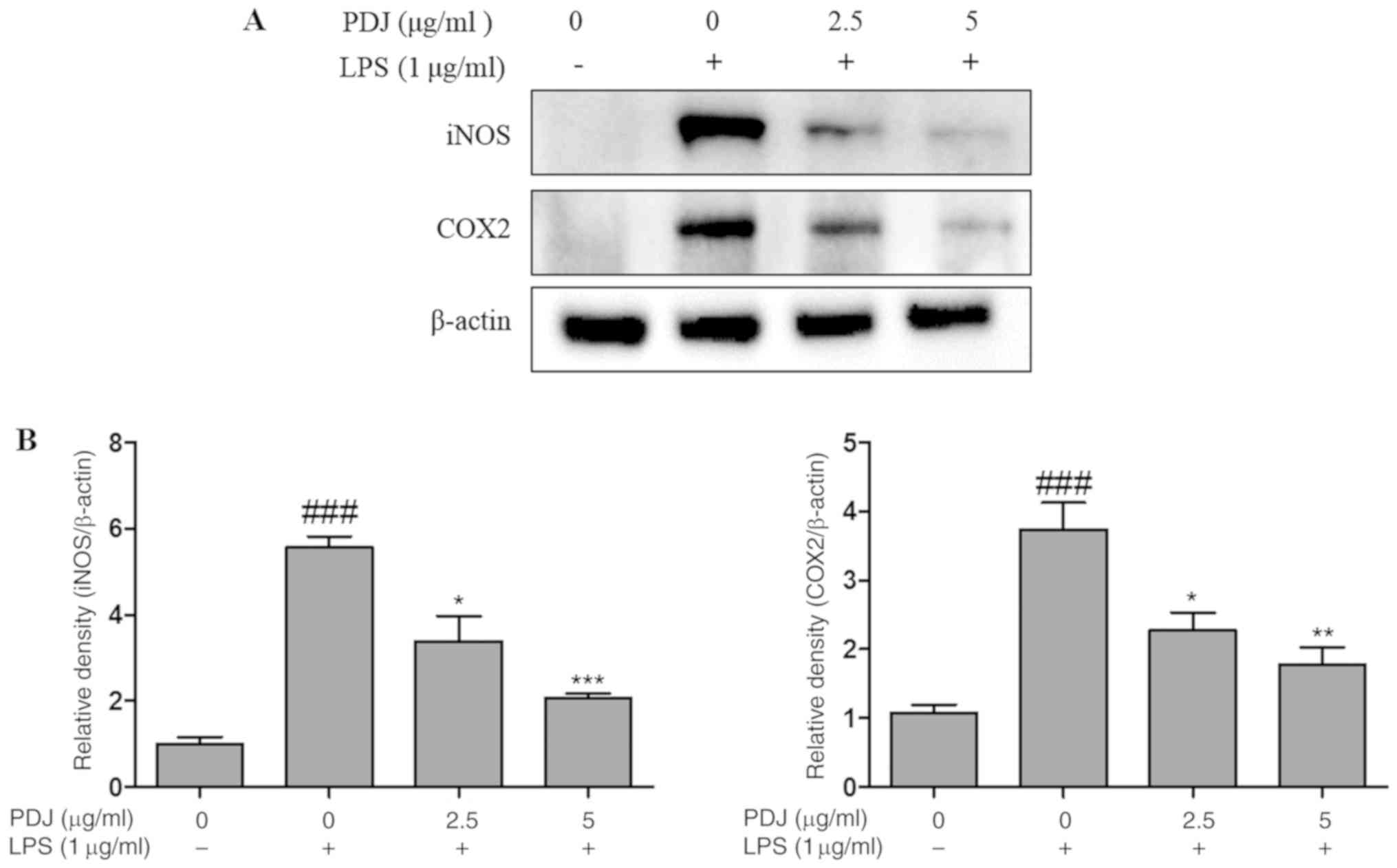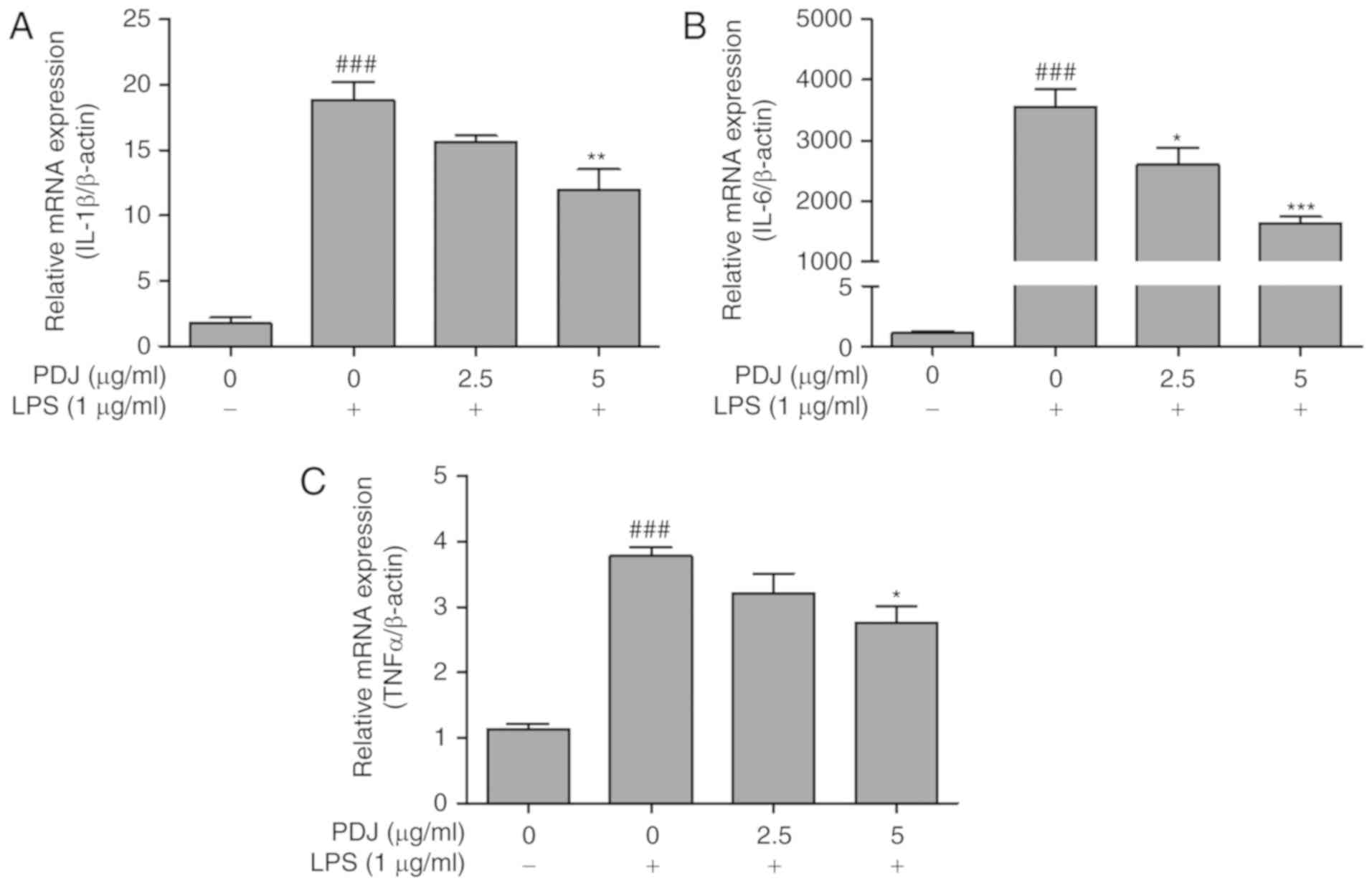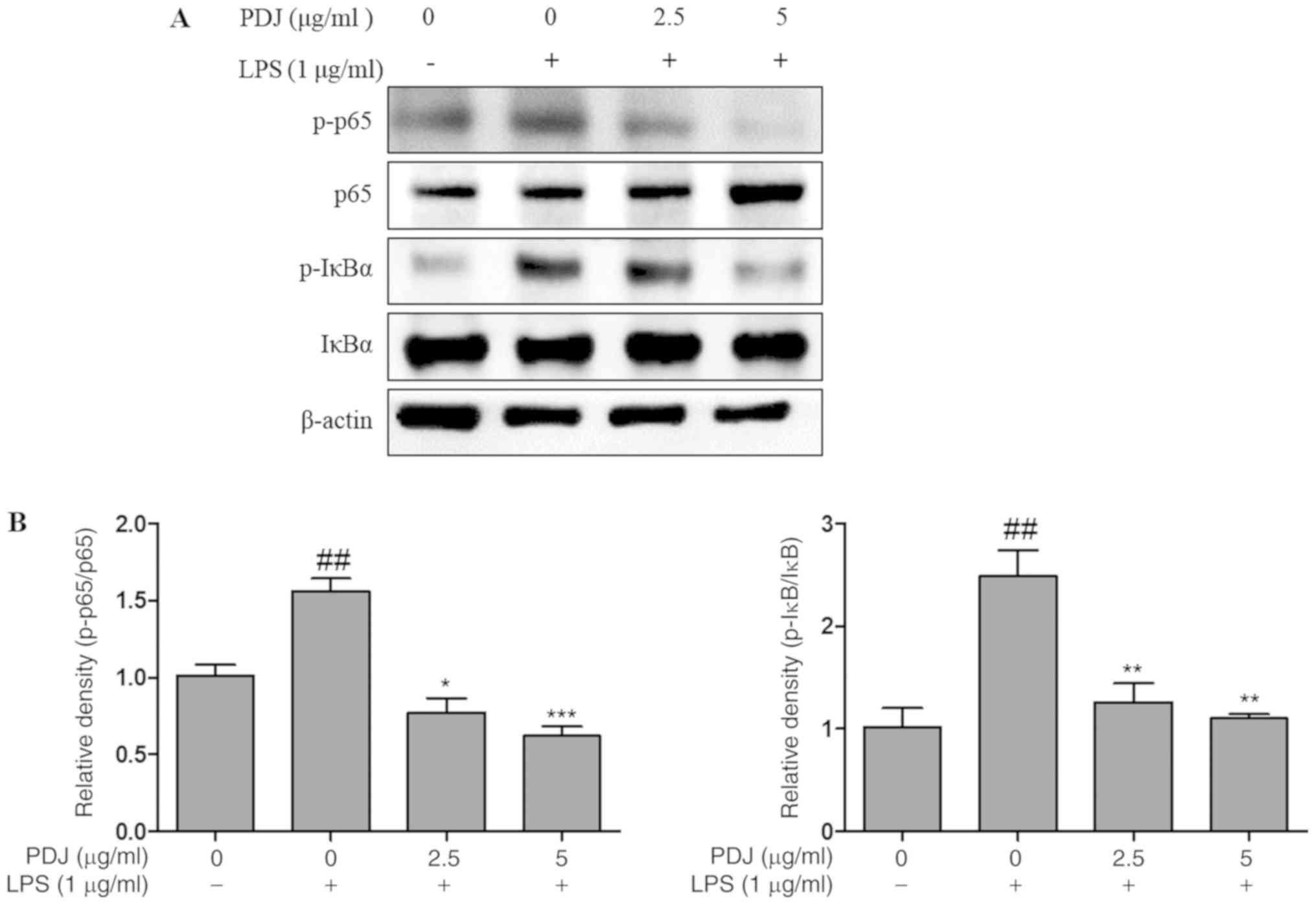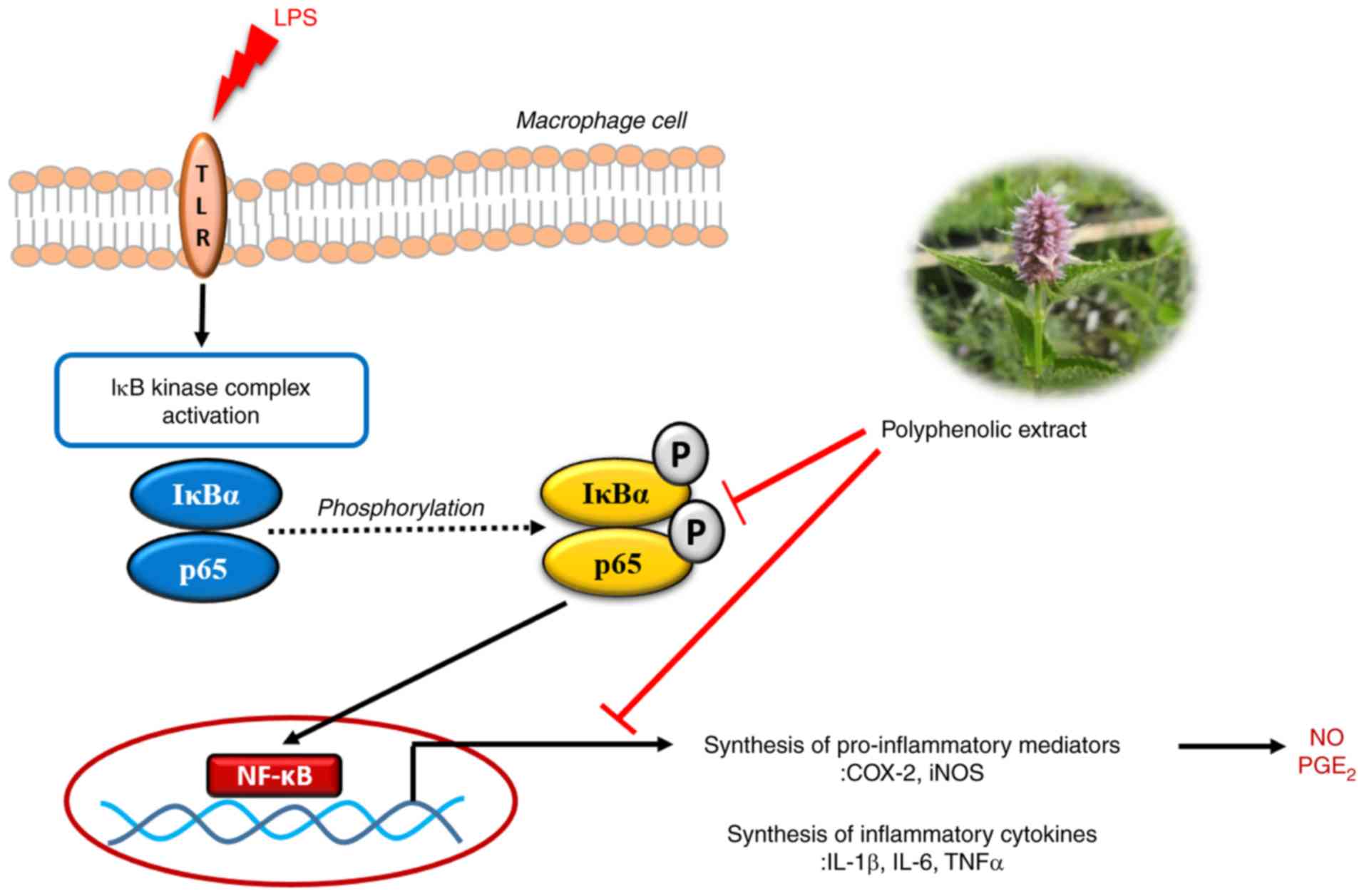|
1
|
Wu C, Zhao W, Zhang X and Chen X:
Neocryptotanshinone inhibits lipopolysaccharide-induced
inflammation in RAW264.7 macrophages by suppression of NF-κB and
iNOS signaling pathways. Acta Pharm Sin B. 5:323–329. 2015.
View Article : Google Scholar : PubMed/NCBI
|
|
2
|
Jeong SG, Kim S, Kim HG, Kim E, Jeong D,
Kim JH, Yang WS, Oh J, Sung GH, Hossain MA, et al: Mycetia
cauliflora methanol extract exerts anti-inflammatory activity by
directly targeting PDK1 in the NF-κB pathway. J Ethnopharmacol.
231:1–9. 2019. View Article : Google Scholar : PubMed/NCBI
|
|
3
|
de Araújo ERD, Félix-Silva J,
Xavier-Santos JB, Fernandes JM, Guerra GCB, de Araújo AA, Araújo
DFS, de Santis Ferreira L, da Silva Júnior AA, Fernandes-Pedrosa MF
and Zucolotto SM: Local anti-inflammatory activity: Topical
formulation containing Kalanchoe brasiliensis and Kalanchoe pinnata
leaf aqueous extract. Biomed Pharmacother. 113:1087212019.
View Article : Google Scholar : PubMed/NCBI
|
|
4
|
Yang G, Lee K, Lee M, Ham I and Choi HY:
Inhibition of lipopolysaccharide-induced nitric oxide and
prostaglandin E2 production by chloroform fraction of Cudrania
tricuspidata in RAW 264.7 macrophages. BMC Complement Altern Med.
12:2502012. View Article : Google Scholar : PubMed/NCBI
|
|
5
|
Demoruelle MK, Deane KD and Holers VM:
When and where does inflammation begin in rheumatoid arthritis?
Curr Opin Rheumatol. 26:64–71. 2014. View Article : Google Scholar : PubMed/NCBI
|
|
6
|
Hotchkiss RS, Moldawer LL, Opal SM,
Reinhart K, Turnbull IR and Vincent JL: Sepsis and septic shock.
Nat Rev Dis Primers. 2:160452016. View Article : Google Scholar : PubMed/NCBI
|
|
7
|
Luo G, Cheng BC, Zhao H, Fu XQ, Xie R,
Zhang SF, Pan SY and Zhang Y: Schisandra Chinensis Lignans
suppresses the production of inflammatory mediators regulated by
NF-κB, AP-1, and IRF3 in lipopolysaccharide-stimulated RAW264.7
Cells. Molecules. 23:2018. View Article : Google Scholar
|
|
8
|
Chen L, Deng H, Cui H, Fang J, Zuo Z, Deng
J, Li Y, Wang X and Zhao L: Inflammatory responses and
inflammation-associated diseases in organs. Oncotarget.
9:7204–7218. 2017.PubMed/NCBI
|
|
9
|
Abdulkhaleq LA, Assi MA, Abdullah R,
Zamri-Saad M, Taufiq-Yap YH and Hezmee MNM: The crucial roles of
inflammatory mediators in inflammation: A review. Vet World.
11:627–635. 2018. View Article : Google Scholar : PubMed/NCBI
|
|
10
|
Meng F and Lowell CA: Lipopolysaccharide
(LPS)-induced macrophage activation and signal transduction in the
absence of Src-family kinases Hck, Fgr, and Lyn. J Exp Med.
185:1661–1670. 1997. View Article : Google Scholar : PubMed/NCBI
|
|
11
|
Hutchins AP, Takahashi Y and
Miranda-Saavedra D: Genomic analysis of LPS-stimulated myeloid
cells identifies a common pro-inflammatory response but divergent
IL-10 anti-inflammatory responses. Sci Rep. 5:91002015. View Article : Google Scholar : PubMed/NCBI
|
|
12
|
Cecilia OM, José Alberto CG, José NP,
Ernesto Germán CM, Ana Karen LC, Luis Miguel RP, Ricardo Raúl RR
and Adolfo Daniel RC: Oxidative stress as the main target in
diabetic retinopathy pathophysiology. J Diabetes Res.
2019:85624082019. View Article : Google Scholar : PubMed/NCBI
|
|
13
|
Zuo L, Prather ER, Stetskiv M, Garrison
DE, Meade JR, Peace TI and Zhou T: Inflammaging and oxidative
stress in human diseases: From molecular mechanisms to novel
treatments. Int J Mol Sci. 20:2019. View Article : Google Scholar
|
|
14
|
Mayouf N, Charef N, Saoudi S, Baghiani A,
Khennouf S and Arrar L: Antioxidant and anti-inflammatory effect of
Asphodelus microcarpus methanolic extracts. J Ethnopharmacol.
239:1119142019. View Article : Google Scholar : PubMed/NCBI
|
|
15
|
Han JM, Lee EK, Gong SY, Sohng JK, Kang YJ
and Jung HJ: Sparassis crispa exerts anti-inflammatory activity via
suppression of TLR-mediated NF-κB and MAPK signaling pathways in
LPS-induced RAW264.7 macrophage cells. J Ethnopharmacol. 231:10–18.
2019. View Article : Google Scholar : PubMed/NCBI
|
|
16
|
Shah M, Ullah MA, Drouet S, Younas M,
Tungmunnithum D, Giglioli-Guivarc'h N, Hano C and Abbasi BH:
Interactive effects of light and melatonin on biosynthesis of
silymarin and anti-inflammatory potential in callus cultures of
Silybum marianum (L.) Gaertn. Molecules. 24:12072019.
View Article : Google Scholar
|
|
17
|
Lawrence T: The nuclear factor NF-kappaB
pathway in inflammation. Cold Spring Harb Perspect Biol.
1:a0016512009. View Article : Google Scholar : PubMed/NCBI
|
|
18
|
Song C, Hong YH, Park JG, Kim HG, Jeong D,
Oh J, Sung GH, Hossain MA, Taamalli A, Kim JH, et al: Suppression
of Src and Syk in the NF-κB signaling pathway by Olea
europaea methanol extract is leading to its anti-inflammatory
effects. J Ethnopharmacol. 235:38–46. 2019. View Article : Google Scholar : PubMed/NCBI
|
|
19
|
Han SY, Yi YS, Jeong SG, Hong YH, Choi KJ,
Hossain MA, Hwang H, Rho HS, Lee J, Kim JH and Cho JY: Ethanol
extract of Lilium bulbs plays an anti-inflammatory role by
targeting the IKK[Formula: see text]/[Formula: see text]-mediated
NF-[Formula: see text]B pathway in macrophages. Am J Chin Med.
46:1281–1296. 2018. View Article : Google Scholar : PubMed/NCBI
|
|
20
|
Han B, Dai Y, Wu H, Zhang Y, Wan L, Zhao
J, Liu Y, Xu S and Zhou L: Cimifugin inhibits inflammatory
responses of RAW264.7 cells induced by lipopolysaccharide. Med Sci
Monit. 25:409–417. 2019. View Article : Google Scholar : PubMed/NCBI
|
|
21
|
Abad MJ, Bedoya LM, Apaza L and Bermejo P:
The Artemisia L. genus: A review of bioactive essential
oils. Molecules. 17:2542–2566. 2012. View Article : Google Scholar : PubMed/NCBI
|
|
22
|
Lee J, Narayan VP, Hong EY, Whang WK and
Park T: Artemisia iwayomogi extract attenuates high-fat
diet-induced hypertriglyceridemia in mice: Potential involvement of
the adiponectin-AMPK pathway and very low density lipoprotein
assembly in the liver. Int J Mol Sci. 18:2017. View Article : Google Scholar
|
|
23
|
Lee YK, Hong EY and Whang WK: Inhibitory
effect of chemical constituents isolated from Artemisia
iwayomogi on polyol pathway and simultaneous quantification of
major bioactive compounds. Biomed Res Int.
2017:73756152017.PubMed/NCBI
|
|
24
|
Sandhiutami NM, Moordiani M, Laksmitawati
DR, Fauziah N, Maesaroh M and Widowati W: In vitro assesment of
anti-inflammatory activities of coumarin and Indonesian cassia
extract in RAW264.7 murine macrophage cell line. Iran J Basic Med
Sci. 20:99–106. 2017.PubMed/NCBI
|
|
25
|
Erbel C, Rupp G, Helmes CM, Tyka M, Linden
F, Doesch AO, Katus HA and Gleissner CA: An in vitro model to study
heterogeneity of human macrophage differentiation and polarization.
J Vis Exp. e503322013.PubMed/NCBI
|
|
26
|
Livak KJ and Schmittgen TD: Analysis of
relative gene expression data using real-time quantitative PCR and
the 2(-Delta Delta C(T)) method. Methods. 25:402–408. 2001.
View Article : Google Scholar : PubMed/NCBI
|
|
27
|
Pan SY, Zhou SF, Gao SH, Yu ZL, Zhang SF,
Tang MK, Sun JN, Ma DL, Han YF, Fong WF and Ko KM: New perspectives
on how to discover drugs from herbal medicines: CAM's outstanding
contribution to modern therapeutics. Evid Based Complement Alternat
Med. 2013:6273752013. View Article : Google Scholar : PubMed/NCBI
|
|
28
|
Maione F, Russo R, Khan H and Mascolo N:
Medicinal plants with anti-inflammatory activities. Nat Prod Res.
30:1343–1352. 2016. View Article : Google Scholar : PubMed/NCBI
|
|
29
|
Yu HH, Kim YH, Kil BS, Kim KJ, Jeong SI
and You YO: Chemical composition and antibacterial activity of
essential oil of Artemisia iwayomogi. Planta Med.
69:1159–1162. 2003. View Article : Google Scholar : PubMed/NCBI
|
|
30
|
Park WS, Son YK, Ko EA, Choi SW, Kim N,
Choi TH, Youn HJ, Jo SH, Hong DH and Han J: A carbohydrate
fraction, AIP1, from Artemisia iwayomogi reduces the action
potential duration by activation of rapidly activating delayed
rectifier K channels in rabbit ventricular myocytes. Korean J
Physiol Pharmacol. 14:119–125. 2010. View Article : Google Scholar : PubMed/NCBI
|
|
31
|
Abramson SB: Nitric oxide in inflammation
and pain associated with osteoarthritis. Arthritis Res Ther. 10
(Suppl 2):S22008. View
Article : Google Scholar : PubMed/NCBI
|
|
32
|
Li T, Liu B, Guan H, Mao W, Wang L, Zhang
C, Hai L, Liu K and Cao J: PGE2 increases inflammatory damage in
Escherichia coli-infected bovine endometrial tissue in vitro
via the EP4-PKA signaling pathway. Biol Reprod. 100:175–186. 2019.
View Article : Google Scholar : PubMed/NCBI
|
|
33
|
Ezzat SM, Raslan M, Salama MM, Menze ET
and El Hawary SS: In vivo anti-inflammatory activity and UPLC-MS/MS
profiling of the peels and pulps of Cucumis melo var.
cantalupensis and Cucumis melo var.
reticulatus. J Ethnopharmacol. 237:245–254. 2019. View Article : Google Scholar : PubMed/NCBI
|
|
34
|
Park SB, Park GH, Kim HN, Son HJ, Song HM,
Kim HS, Jeong HJ and Jeong JB: Anti-inflammatory effect of the
extracts from the branch of Taxillus yadoriki being
parasitic in Neolitsea sericea in LPS-stimulated RAW264.7
cells. Biomed Pharmacother. 104:1–7. 2018. View Article : Google Scholar : PubMed/NCBI
|
|
35
|
Hong GE, Kim JA, Nagappan A, Yumnam S, Lee
HJ, Kim EH, Lee WS, Shin SC, Park HS and Kim GS: Flavonoids
identified from Korean Scutellaria baicalensis georgi
inhibit inflammatory signaling by suppressing activation of NF-κB
and MAPK in RAW 264.7 cells. Evid Based Complement Alternat Med.
2013:9120312013. View Article : Google Scholar : PubMed/NCBI
|
|
36
|
Herencia F, Ferrándiz ML, Ubeda A, Guillén
I, Dominguez JN, Charris JE, Lobo GM and Alcaraz MJ: Novel
anti-inflammatory chalcone derivatives inhibit the induction of
nitric oxide synthase and cyclooxygenase-2 in mouse peritoneal
macrophages. FEBS Lett. 453:129–134. 1999. View Article : Google Scholar : PubMed/NCBI
|
|
37
|
Muniandy K, Gothai S, Badran KMH, Suresh
Kumar S, Esa NM and Arulselvan P: Suppression of proinflammatory
cytokines and mediators in LPS-induced RAW 264.7 macrophages by
stem extract of Alternanthera sessilis via the inhibition of
the NF-κB pathway. J Immunol Res. 2018:34306842018. View Article : Google Scholar : PubMed/NCBI
|
|
38
|
Wojdasiewicz P, Poniatowski ŁA and
Szukiewicz D: The role of inflammatory and anti-inflammatory
cytokines in the pathogenesis of osteoarthritis. Mediators Inflamm.
2014:5614592014. View Article : Google Scholar : PubMed/NCBI
|
|
39
|
Tzeng HE, Tsai CH, Ho TY, Hsieh CT, Chou
SC, Lee YJ, Tsay GJ, Huang PH and Wu YY: Radix Paeoniae Rubra
stimulates osteoclast differentiation by activation of the NF-κB
and mitogen-activated protein kinase pathways. BMC Complement
Altern Med. 18:1322018. View Article : Google Scholar : PubMed/NCBI
|
|
40
|
Fernandes A, Sousa A, Mateus N, Cabral M
and de Freitas V: Analysis of phenolic compounds in cork from
Quercus suber L. by HPLC-DAD/ESI-MS. Food Chem.
125:1398–1405. 2011. View Article : Google Scholar
|
|
41
|
Del Rio D, Stewart AJ, Mullen W, Burns J,
Lean ME, Brighenti F and Crozier A: HPLC-MSn analysis of phenolic
compounds and purine alkaloids in green and black tea. J Agric Food
Chem. 52:2807–2815. 2004. View Article : Google Scholar : PubMed/NCBI
|
|
42
|
Prasain JK, Peng N, Dai Y, Moore R,
Arabshahi A, Wilson L, Barnes S, Michael Wyss J, Kim H and Watts
RL: Liquid chromatography tandem mass spectrometry identification
of proanthocyanidins in rat plasma after oral administration of
grape seed extract. Phytomedicine. 16:233–243. 2009. View Article : Google Scholar : PubMed/NCBI
|
|
43
|
Gardana C, Scaglianti M, Pietta P and
Simonetti P: Analysis of the polyphenolic fraction of propolis from
different sources by liquid chromatography-tandem mass
spectrometry. J Pharm Biomed Anal. 45:390–399. 2007. View Article : Google Scholar : PubMed/NCBI
|
|
44
|
Han B, Xin Z, Ma S, Liu W, Zhang B, Ran L,
Yi L and Ren D: Comprehensive characterization and identification
of antioxidants in Folium Artemisiae Argyi using
high-resolution tandem mass spectrometry. J Chromatogr B Analyt
Technol Biomed Life Sci. 1063:84–92. 2017. View Article : Google Scholar : PubMed/NCBI
|
|
45
|
Barros L, Dueñas M, Carvalho AM, Ferreira
IC and Santos-Buelga C: Characterization of phenolic compounds in
flowers of wild medicinal plants from Northeastern Portugal. Food
Chem Toxicol. 50:1576–1582. 2012. View Article : Google Scholar : PubMed/NCBI
|
|
46
|
Li F, Zhang YB, Wei X, Song CH, Qiao MQ
and Zhang HY: Metabolic profiling of Shu-Yu capsule in rat serum
based on metabolic fingerprinting analysis using HPLC-ESI-MSn. Mol
Med Rep. 13:4191–4204. 2016. View Article : Google Scholar : PubMed/NCBI
|
|
47
|
Olennikov DN, Chirikova NK, Kashchenko NI,
Nikolaev VM, Kim SW and Vennos C: Bioactive phenolics of the genus
Artemisia (Asteraceae): HPLC-DAD-ESI-TQ-MS/MS profile of the
Siberian species and their inhibitory potential against α-amylase
and α-glucosidase. Front Pharmacol. 9:7562018. View Article : Google Scholar : PubMed/NCBI
|
|
48
|
Pati S, Losito I, Gambacorta G, La Notte
E, Palmisano F and Zambonin PG: Simultaneous separation and
identification of oligomeric procyanidins and anthocyanin-derived
pigments in raw red wine by HPLC-UV-ESI-MSn. J Mass Spectrom.
41:861–871. 2006. View Article : Google Scholar : PubMed/NCBI
|
|
49
|
Schütz K, Kammerer DR, Carle R and
Schieber A: Characterization of phenolic acids and flavonoids in
dandelion (Taraxacum officinale WEB. ex WIGG.) root and herb
by high-performance liquid chromatography/electrospray ionization
mass spectrometry. Rapid Commun Mass Spectrom. 19:179–186. 2005.
View Article : Google Scholar : PubMed/NCBI
|
|
50
|
Han J, Ye M, Qiao X, Xu M, Wang BR and Guo
DA: Characterization of phenolic compounds in the Chinese herbal
drug Artemisia annua by liquid chromatography coupled to
electrospray ionization mass spectrometry. J Pharm Biomed Anal.
47:516–525. 2008. View Article : Google Scholar : PubMed/NCBI
|
|
51
|
Orčić D, Francišković M, Bekvalac K,
Svirčev E, Beara I, Lesjak M and Mimica-Dukić N: Quantitative
determination of plant phenolics in Urtica dioica extracts
by high-performance liquid chromatography coupled with tandem mass
spectrometric detection. Food Chem. 143:48–53. 2014. View Article : Google Scholar : PubMed/NCBI
|
|
52
|
Ye M, Yang WZ, Liu KD, Qiao X, Li BJ,
Cheng J, Feng J, Guo DA and Zhao YY: Characterization of flavonoids
in Millettia nitida var. hirsutissima by HPLC/DAD/ESI-MS
n. J Pharm Anal. 2:35–42. 2012. View Article : Google Scholar : PubMed/NCBI
|















